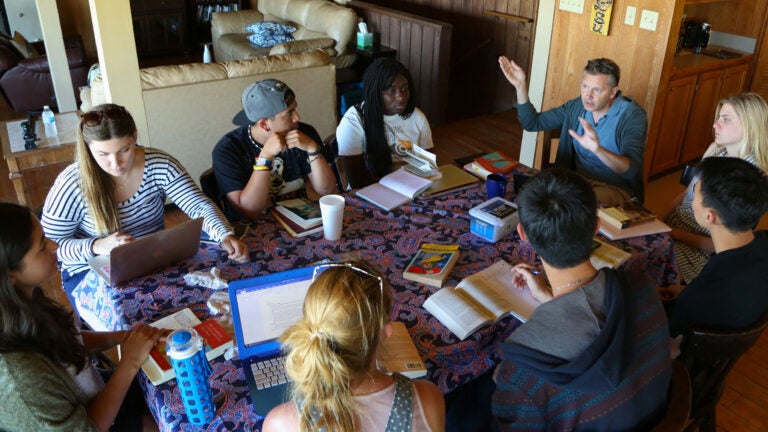
Maymester offers students a chance to travel to a new place and immerse themselves in an intensive learning environment. (USC Photo/Mike Glier)
Short USC courses take students to New Orleans, Paris and beyond
The short, intense courses give students a chance to explore a new subject — and perhaps do some traveling. Paris or Shanghai, anyone?
Rows of hand-blown apothecary jars line the old wooden shelves of the New Orleans Pharmacy Museum, housed in an early 19th-century town house in the city’s historic French quarter. The group of USC undergraduates clustered around those containing age-old potions used by practitioners of voodoo, including the infamous “Love Potion Number 9.”
The students’ interest in the voodoo artifacts was piqued by the fact that the group — all participants in the monthlong “Maymester” course “Bookpacking ‘The Big Easy’: A Cultural and Literary Journey” from the USC Dornsife College of Letters, Arts and Sciences — were also reading Anne Rice’s gothic horror tale Interview with the Vampire.
“The novel is full of fantastically visual imagery, and there’s no book better to savor a feeling of New Orleans in the early years of its growth when it’s a Creole society, but also decadent and opulent,” said USC Dornsife’s Andrew Chater, who led the course. “It’s a book that oozes superstition, incorporating elements of vampirism and voodoo.”
USC Maymester courses: short and intense
Maymester courses are short courses USC students can take for credit after the traditional spring semester finishes in May. Some are local – Los Angeles, Santa Barbara or Catalina Island – while others are all over the globe, from major European and Asian capitals to exotic locales like Havana and Marrakech. It’s a perfect fit for the bookpacking concept created by Chater, the award-winning British filmmaker and presenter.
“What I find as I travel with books is that the book informs the place and the place informs the book,” he said. Chater encourages his students to use novels almost as guidebooks, adopting a holistic approach to the humanities whereby literature, history, geography, politics and social studies combine into a unified course of study.
In her course blog during last year’s Maymester, English major Olivia Jones described how bookpacking had informed a deeper understanding of the Louisiana city, its history and its culture.
“We had become part of that dialogue, part of the story of New Orleans,” she wrote, “our books shedding light in corners of the city that would have otherwise been overlooked.”
Chater picked Louisiana as the destination for his USC Dornsife bookpacking course because of its extraordinarily vibrant and diverse literary culture.
Cultural gumbo
His selection of novels for the course reflected that cultural gumbo, including works that addressed the region’s Creole, Cajun, rural white Protestant, Catholic and African-American roots.
Last year’s course began with a three-night stay in Grand Isle, an island on the southern Louisiana coast that is the setting for Kate Chopin’s late 19th-century novella The Awakening, an early feminist work that takes place in Creole society. The students stayed in a traditional wooden fisherman’s house on stilts overlooking the Gulf and followed in the steps of the book’s unorthodox heroine, Edna Pontellier, as they made their way along the sandy path that leads through the dunes and down to the beach.
In New Orleans, they read Walker Percy’s existential novel The Moviegoer and John Kennedy Toole’s rambunctious, comedic romp, A Confederacy of Dunces. The group visited Baton Rouge, where they studied Robert Penn Warren’s tale of a corrupt Southern politician, All the King’s Men. They then spent time in Lafayette and Cajun Country where they met Ernest J. Gaines, author of the classic A Lesson Before Dying, set in the rural black South. Other highlights included trips to a plantation and a New Orleans cemetery.
Out of the classroom
Chater believes that literature only gives a small fraction of its educational potential when it is confined uniquely to the classroom. By studying books in places they are set, he argues, they provide a tremendous insight to regional cultures and their history.
What you get with bookpacking is a wonderful way to combine different disciplines.
Andrew Chater
“What you get with bookpacking is a wonderful way to combine different disciplines,” he said. “It’s not just a study of literature — far from it. It’s a study of literature within a historical, geographical, social and political context. It’s the whole kit and caboodle of the humanities.”
USC Dornsife offers about two dozen Maymester classes each year. The USC Annenberg School for Communication and Journalism also offers Maymester programs in the Bay Area and in New York City, while the USC Thornton School of Music and the USC Kaufman School of Dance team up for a joint Maymester course in Paris.



